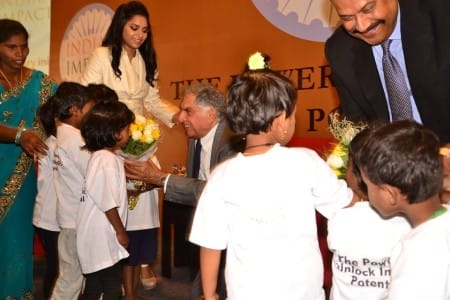Stories come from unexpected places. Last year, I covered the Wharton Supply Chain Conference. (Wharton Magazine often covers student-run conferences; they provide great content, and alumni often speak and participate at them.) A few weeks ago, my contact at that conference, Jacob Dinkel, W’13, forwarded me the name of the student who co-chaired that conference: Ridhima Parvathaneni, ENG’13, W’13.
That very week, on Nov. 29, 2013, Parvathaneni had officially launched her social enterprise platform, The Indian Impact, in Hyderabad. Every major media outlet in India was covering or had already covered the event, in part because the grandfather of modern Indian business was its advocate, Tata Group’s Chairman Emeritus Ratan Tata.

From the launch of The Indian Impact with Ridhima Parvathaneni, ENG’13, W’13, and Tata Group Chairman Emeritus Ratan Tata
Parvathaneni, at the time president of the Wharton Supply Chain Club, had approached him when she was still an undergraduate in Penn’s Jerome Fisher Program in Management and Technology. These were her last few months at Wharton. She had just finished midterms, as she recalled, and she knew that soon she would be returning to her family logistics business and Hyderabad. It was her chance to make a difference.
“I always wanted to do something to help build the nation,” she said during our recent phone interview, yet she realized that India has many problems and many young people aspiring to help. Parvathaneni didn’t want to just go into a Nongovernmental organization, and she didn’t want to focus on every issue.
So she focused on one issue: malnutrition. About 42 percent of Indian children are malnourished, and 1,500 die every day from it, she said. She devised an innovative solution: an online platform that would allow Indians to connect and address this issue with their own initiative.
Still on campus, she advertised the idea to her friends. Interest was high. She interviewed about 100 students who wanted to participate and narrowed the group down to a handful. Then she sent Tata a letter, explaining her solution to a problem she knew he was personally interested in. Tata replied. They met in Mumbai during her final spring semester.
From there, it was a matter of getting the platform ready for the launch that November—all while helping to operate the family business.
How was Parvathaneni able to handle this overflowing plate? The M&T Program. Once you enroll in the Jerome Fisher Program in Management and Technology, you know how to work hard.
“You really have to manage your time well,” she said of that notoriously challenging program.
How will she be able to keep up the pace? Now that The Indian Impact is live, it will build on its own momentum, she said. Her team has already chosen four brand ambassadors at universities and schools across the Hyderabad region. The ambassadors are tasked with raising awareness about malnutrition and funds on their respective campuses to combat it. Parvathaneni and her team will coordinate this decentralized marketing approach, as well as explore and launch major brand partnerships.
Sure, The Indian Impact will grow through the efforts of countless volunteers. Yet we can be pretty sure that Parvathaneni will continue to work at that M&T level, which is all the more reason to keep an eye on her.

























